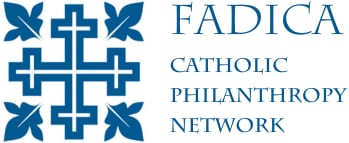Bonita Springs, Florida — The thirty third annual meeting of Foundations and Donors Interested in Catholic Activities (FADICA) honored two individuals for leadership and church service when its members met January 29-30 here.
Cardinal John P. Foley, former President of the Pontifical Council for Social Communications, and now Grand Master of the International Order of the Holy Sepulcher, received FADICA’s 2009 Distinguished Catholic Leadership Award for “outstanding service to the worldwide Catholic community and for a generous and inspiring vision of the communications apostolate”.
Cardinal Foley received the honor at a dinner attended by over one hundred foundation board chairs, trustees, and guests on January 29th.
Also honored during the FADICA annual meeting was Sister of Charity of Cincinnati, Sally Duffy, SC. She was the 2009 recipient of the Charles Carroll Award in Catholic Philanthropy. Sister Duffy, President of the SC Ministry Foundation, was chosen for the award because of her “heroic leadership” in orchestrating a multi-million dollar fundraising effort through her order, FADICA, the Leadership Conference of Women Religious, and Catholic Charities USA. The multi-million dollar program benefitted recovery efforts for the religious women of New Orleans.
Those present for the FADICA honors were attending an annual conference of Catholic grant makers that included experts in philanthropy from around the country. The conference was entitled: Reinventing Catholic Philanthropy.
Conference speakers included Dr. John Wimmer of the Religion Division of the Lilly Endowment, who spoke to FADICA on the issue of capacity building – foundation assistance that helps to develop and build a nonprofit’s internal leadership and structure.
According to Dr. Wimmer, “philanthropy does its best work, when it surrounds its financial role with other gifts that work together to build capacity of its grantees.”
There are four areas of capacity building where foundations can be especially valuable, said Dr. Wimmer – asking the generative questions, offering financial resources for innovation and experimentation, providing a convening community, and evaluating as a learning experience.
A dozen other speakers also addressed FADICA on emerging trends in philanthropy.
Sister Mary Scullion, founder of Project Home, a Philadelphia based program that sponsors 500 units of affordable housing, a restaurant used for job training and a health clinic, urged FADICA members to embrace a philanthropy that is done in a spirit of partnership with other foundations and the community.
Colleen Hegranes, Vice President of St. Catherine’s College in St. Paul, told foundation trustees present to find ways to leverage resources across ministries. Presently the College is bringing together foundations, health ministries, and higher education to address critical shortages in U.S. health care, she said.
A significant voice for streamlining private philanthropy was Bill Sommerville, author of the bestselling book, Grassroots Philanthropy, and an experienced philanthropist from the San Francisco Bay area.
Sommerville urged members of FADICA to pare back on paper requirements, speed up response time for proposals, link up with other foundations, and look for outstanding, talented individuals whom they can trust, as they chose their grantees.
Conference participants expressed a growing concern over the environment for giving at present – a combination of the growing unemployment during the recession, and what some described as a loss of “market share” for religious philanthropy within total U.S. charitable giving.
“. . .Religion in America has lost its percentage of total (U.S.)giving,” Dr. Wimmer told FADICA. “Religious organizations on the whole are not especially good at talking about money and not especially good at asking for money,” he said.
Quoting a recent national survey on religious giving, Cardinal Foley said, “despite a massive growth in per capita income, the percentage of income donated declined rather than increased during the 20th Century,” he reported.
“I am personally convinced that generosity is related to faith”, the Cardinal said. “The greater and deeper our faith, the greater will be our generosity,” he added.
Other developments at the FADICA meeting included the addition of the Catholic Church Extension Society to the organization’s membership. Extension is a national grant making organization devoted to assisting poorer dioceses in the U.S. Historically, Extension has built churches, funded religious education programs, supported Catholic campus ministry, and underwritten seminarian education.
The FADICA board also elected Mr. Robert Smith, Chairman of the Carrie Estelle Doheny Foundation of Los Angeles, to its seventeen member board of directors.
Edited proceedings from the FADICA conference will be available next month.
FADICA is an association of over fifty private grant makers who meet regularly to discuss trends of importance to Catholic giving and to interact with church leaders and experts in order to improve their philanthropic practices.


